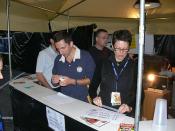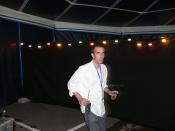"Sleep, Neurobehavioral Functioning, and Behavior Problems in School-Age Children"
Avi Sadeh, Reut Gruber, and Amiran Raviv wrote the article, "Sleep, Neurobehavioral Functioning, and Behavior Problems in School-Age Children," in 2000, which may be found in the journal Child Development, volume 73, number 2, on pages 405-417. The article was written about a study conducted in order explore the associations between sleep and neurobehavioral functioning (NBF) in everyday children of the school age using objective measures, focusing on whether younger children would show a stronger effect with sleep disruptions than older children. It was hypothesized that the early morning NBF would have a stronger association with sleep quality than the NBF later in the day. Also, it was hypothesized that tasks that involved more complex cognitive functions and required sustained involvement of the attention system would show higher relationship with sleep variations as opposed to the more simple motor or memory tasks.
In order to conduct this study, one hundred and thirty-five children were studied from one of three age groups: Second grade (48 students, ages 7.2 - 8.6 years), fourth grade (36 students, ages 9.3 - 10.4 years), and sixth grade (51 students, ages 11.2 - 12.7 years). Only children with acute physical illness and children receiving medication were excluded from the study in order to obtain an accurate reading. Most of the children came from small, two-parent, middle- to upper-class families whose parents were well educated. 38 percent of the children were firstborn.
To begin the procedure, the parents of the children completed a number of questionnaires, including one of family background material and the Child Behavior Checklist (CBCL). Within the following two to four weeks the children's sleep and NBF were evaluated. They were tested twice within the same week with the Neurobehavioral Evaluation System (NES) in school...


